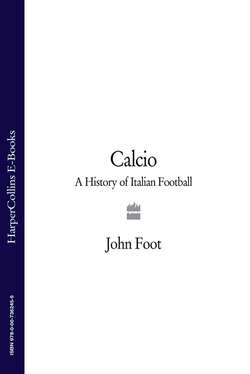Читать книгу Calcio: A History of Italian Football - John Foot - Страница 40
Bribing Referees. Cheques and more watches
Оглавление‘Only the referee can send a player off’
Football Federation Rule Book, 2002–2003
Given the widespread view that all referees are corrupt, unless proven otherwise, you would expect the history of Italian football to be packed with cases of corruption involving match officials. In fact, quite the opposite is the case. There have been many more cases of corruption, match-fixing and illegal betting involving players, managers and presidents than there have been involving referees. In 120 years of calcio history, very few referees have been caught in the act of taking bribes or fixing games. In a corrupt world, Italian referees have been paragons of legality. This could be seen as proof, if more proof were needed, of their heroic, virtuous minority status. The average Italian fan has an easy reply to this point. You do not need to bribe referees. They naturally favour certain teams at certain times. They are simply pawns in much wider power games. They become successful by helping the powerful, and following orders.
Nonetheless, there have been cases of referee corruption in the Italian game. In the early 1950s a group of referees were banned for life after it was revealed that they had been fixing results over a number of years. Later, one of the best-documented scandals involved referee Ugo Scaramella and Catania football club, at that time (1955 – a terrible year for the game in Italy, with at least three scandals) fighting against relegation to Serie B. This was not a simple story of corruption, and doubts remain about the real motives of the people involved. The whistle was blown by a journalist – Giulio Sterlini – who had also worked for the club in the past. According to Sterlini, he had personally given three cheques to Scaramella on three separate occasions, and had also bribed the referee’s cousin to find out which games he would be officiating. Some claimed that Sterlini was trying to blackmail Catania with this information. The club filled the papers with dirt on the journalist – he had, for example, been banned from every school in Italy when he was a student – and argued that the stories were revenge for his sacking by Catania. Yet, Sterlini’s story checked out – especially the money part. The club was sent down to Serie B; Scaramella received a life ban.
Other scandals have arisen which have placed referees in a good light – such as in 1974 when controversial referee Gino Menicucci was offered a watch (by a Foggia official) in his dressing room before a game with Milan. The watch was refused, and Menicucci mentioned the ‘bribe’ to the Milan president. After a 0–0 draw (which sent Foggia down), the gift was put on the table once more, and turned down again. Since Foggia were already down, they were punished with a deduction of six points in Serie B while Menicucci emerged with his reputation intact. In more than one hundred years of football history, in a country where scandals have been the norm, not the exception, the number of cases involving referees could be counted on the fingers of one hand. This had not helped their reputation. Venduto! – crook – was still the most common insult hurled at the men and women in black every Sunday afternoon.
